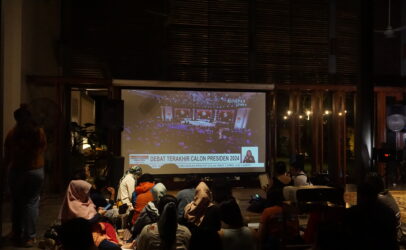
Sorghum Farmer. That is how Andika (26) wrote his profile on each of his social media accounts. He said he was proud to grow sorghum, a versatile food crop that experiences sets back in numbers and erasure.
“Sorghum was once here, according to stories of our elders. But when I was born, there was no sorghum anymore. Now we are introducing it and replanting it,” said Andika regarding sorghum that disappeared from his hometown.
Tapobali Village. Andika’s hometown. An area that the locals call the Land of Rocks; as it is surrounded by a natural fortress of rocks in the south coast of Lembata Island, East Nusa Tenggara (NTT).
In the past, people focused more on planting corn and rice. Recently weather problems triggered by climate change have shifted the planting season. Previously the rainy season occurred from October to March. Now it has changed to November to April.
This situation made them consider about switching commodity. Sorghum then became an important food choice for them. Sorghum is actually not a new food crop for NTT people. In the past, this plant grew abundantly before being forcibly “removed” by the New Order government that was standardizing food crop with rice.
Maybe the land of NTT longs to be planted with sorghum, maybe the land of NTT wants people to have choices and sources of other food crops, so that the unity of human life and nature can continue for a long time.
***
Andika is one of the youth figures in Tapobali. In 2016, when he was in his early 20s, he went to Malaysia to become a migrant worker in a palm plantation. This kind of choice is often made by young Tapobali people. Economic limitation and lack of decent jobs force many of them to leave hometown to look for other ways of living.
Later, Andika found himself surprised when he faced the reality of being a plantation worker. He realized that what he was doing in Malaysia is no different from back home. Working overseas makes money, but the difficulties and work risks are also significant. In hometown, there may not be a lot of money, but you never feel lacking.
“I removed grass in Malaysia. Then I thought the grass in Malaysia and Indonesia is the same, so I better remove grass back in hometown. Currently there are many young people migrating to work in palm oil. They choose to be labors overseas rather than being independent farmers in their hometown,” he said.
Not long after returning to Tapobali Village, Andika began to get acquainted with the Larantuka Socio-Economic Development Foundation (YASPENSEL). This organization focuses on social, economic and environmental issues in NTT. They often support people on the coast of NTT, including Tapobali people in the agricultural sector.
In mid-2018, Yaspensel supported the efforts to plant sorghum in Tapobali Village. Andika was one of the young people trying to plant sorghum. “We share the profit with Yaspensel that provides the capital,” said Andika.
After the successful trial of the sorghum planting, this project was further scaled up. Yaspensel also joined with Pangan Baik Coalition and became part of the Voices for Just Climate Action Alliance, an alliance of non-governmental organizations focusing on campaigning voices for fair climate change action (Voices for Just Climate Action).
Andika was then inspired to prompt the formation of Gebetan. It is an acronym for “Gerep Blamu Tapobali Wolewutun” meaning the young people of Tapobali throughout the village.
This group which consists of dozens of Tapobali young people is actively reintroducing sorghum to the locals. Now around 80 percent farmers in Tapobali Village are starting to look at sorghum.
Gebetan also manages a collective land in which they share the profit together. One of their main commodities is sorghum coffee, a combination of coffee and sorghum.
Gebetan gets coffee from farmers in Botu Village, Lembata Island. The raw material of coffee is combined with sorghum. The mixture is three to one. Three kilograms of sorghum, one kilogram of coffee.
Sorghum acts as a sweetener in this coffee mixture. There has been a lot of research showing sorghum is much better than sugar.
Gebetan group also collaborates with mothers in Tapobali Village. They introduce sorghum as food source to anticipate stunting and teach them how to process sorghum as food.
“Because sorghum was once disappeared from our village, Gebetan explores models of sorghum processing and reintroduces them to the locals,” said Andika.
“We also try other types of plant that are starting to become rare such as jali-jali,” he continued.
***
Profits from planting and selling sorghum are also to finance the activities of Gebetan and the locals. One of them is to fund the revitalization of the spring water in Tapobali Village.
The decision to revitalize the spring water was formed upon discussions with Tapobali people, encouraged through program of Pangan Baik Coalition, in mid-2022. At that time, people were distressing about their first spring water in the village for the water volume being decreased.
The fact that water source is crucial for survival, especially for daily consumption and irrigation for agricultural commodities, there came the initiative to revive the first spring water in Tapobali Village.
In their discussions, they found that one healthy bamboo grove produces 5,000 liter water in the future. Therefore Gebetan leads the planting of bamboo in Tapobali Village.
By the end of 2023, more than 1,000 bamboo saplings have been planted. The capital comes from sorghum planting by Gebetan and joint money of the locals.
Andika said the impact of the climate crisis is being experienced by small communities such as in Tapobali. Scarcity of water sources, unpredictable weather and shift in planting seasons are real.
“What we are doing is only a small part of mitigating the climate change. But if we in this small place can move and act, this should be an encouragement to young people in other places,” said Andika.







